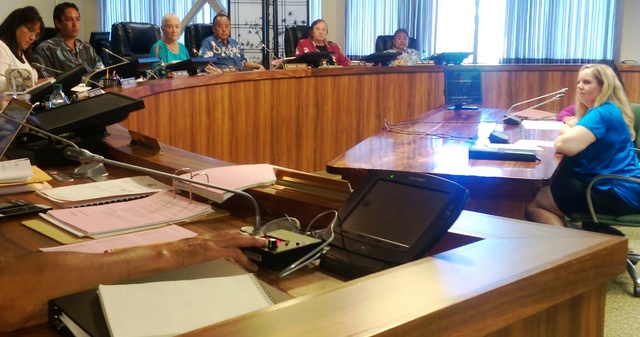County Council members on Tuesday sharpened their debate about county purchasing cards, promising to tighten the law after hearing a presentation from the legislative auditor. ADVERTISING County Council members on Tuesday sharpened their debate about county purchasing cards, promising to
County Council members on Tuesday sharpened their debate about county purchasing cards, promising to tighten the law after hearing a presentation from the legislative auditor.
Fewer than a dozen members of the public came forward to testify about the topic that has been in the news since March, when Big Island newspapers uncovered misuse of the so-called pCards by Mayor Billy Kenoi and some of his top aides.
The audit found 164 transactions totaling $29,961 that did not follow county policy, had a questionable public purpose and may have violated state law. In the 2014 calendar year, the county used approximately 236 purchasing cards spending $1.15 million.
“Simply put, public money, public benefit,” Auditor Bonnie Nims told the council about how the program should work.
Kohala Councilwoman Margaret Wille, who’s been Kenoi’s most vocal critic on the council, questioned why rules need to be clarified just because the mayor broke them. The rules are already pretty clear, she said.
“I just think we need to be candid here. … Certain things are against the rules,” Wille said. “Certain things were done against the rules and now we’re saying, ‘Let’s clarify the rules.’”
Those who addressed the council testified to an erosion of their trust in government and some suggested that all pCard transactions be published online to increase transparency.
Richard Abbett, testifying from Naalehu, called Kenoi’s use of his pCard at bars and for personal purchases “a blemish, a mark of shame that is on the fruit of his good works.”
“This cannot be swept under the rug,” Abbett said. “Fix what the electorate wants fixed and we all know is broken — trust.”
Auditors recommend in the 27-page report the County Council update the county code to more closely follow state purchasing law.
In addition, county administration should update pCard policy and procedures to make them more clear, treat all employees and departments fairly and equitably, strengthen monitoring practices to ensure expenditures are “for a legitimate public purpose and demonstrate a clear benefit to the county and taxpayers,” and use available technology from the card issuer to improve monitoring practices, auditors said.
Puna Councilman Greggor Ilagan said he’s prepared a bill that should be ready for council meetings later this month. Other council members who had planned to initiate legislation are going to wait to see Ilagan’s bill, and offer amendments if needed.
“I just wanted to take the first step,” Ilagan said.
Council Chairman Dru Kanuha, of Kona, said he’s also considering a bill.
“I want to make sure we’ve got the right wording in there,” Kanuha said. “I’m still working on that and whether I put something out there remains to be seen.”
Council members debated whether the county should ban liquor purchases entirely, or specify more clearly when alcohol purchases are allowed. It serves the public purpose, they said, when alcohol is purchased as omiyage or when entertaining dignitaries, such as from sister cities.
“It’s not just entertainment,” said Puna councilman Daniel Paleka. “It’s showing aloha.”
Ilagan said he struggled with definitions in his bill.
“Public purpose is really hard to define, but we should have that flexibility,” he said.
Most council members pointed to the audit report showing that pCard misuse isn’t widespread. They were assured by Nims that cards used improperly have been repaid.
“We shouldn’t get paralyzed because of all of this,” said Hilo Councilman Aaron Chung.



